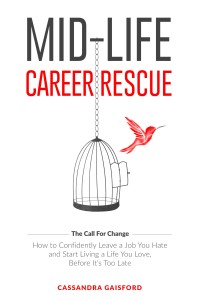Stress less—love life more. How to build real resilience

“He who is of a calm and happy nature will hardly feel the
pressure of age.” ~ Plato
Have you been unhappy at work for so long that some of the symptoms of stress, such as feelings of depression, anxiety or even anger, are really entrenched?
Or is the idea of making a change causing you to feel anxious? Whatever your current situation there is no doubt that managing stress is a key component of making effective career decisions.
Stress is something we all feel every day. It isn’t something that only happens when we’re under particular pressure. Some mild stress is good for you. It gives you a feeling of excitement and makes you want to strive to do better. It reminds you that you’re alive, and it can help you thrive.
But too much stress can do the opposite. Stress overload can make you feel overwhelmed and empty, devoid of enthusiasm; or worse, of a will to live.
Negative thoughts and feelings are a classic sign of too much stress. It’s hard to feel hopeful about the future when you are feeling down, overwhelmed or anxious.
So it’s not surprising that it can be hard to believe in yourself or to remember the things that make you happy. More often than not, during times of strain, your self-esteem and confidence can take an awful hit.
Biologically we’re incapable of sustaining prolonged levels of stress, no matter how great our will. If you don’t address your stress, your body’s adaptive resources can become exhausted – making you sick. Too much stress can give you chronic headaches, affect your blood pressure, contribute to depression and cause ulcers and heart disease.
Thankfully there are simple but powerful strategies at hand to help you avoid too much ‘bad’ stress, so you don’t become ill, anxious or depressed during the change process.
And who knows, maybe once you have your stress levels back in check, or have found ways to proactively remove the sources of stress in either your work or private life, you may end up falling back in love with a job that you’d come to hate.
Heed The Early Warning Signs
According to a definition from The New Zealand Department of Occupational Safety and Health (OSH), stress is a reaction to the excess pressures you face in your life and arises when you feel you can’t cope.
This feeling of not being able to cope is an important point I will come back to, but one of the key things to remember is that worrying about not coping, even if it is not actively voiced, triggers the promotion of stress messages in your brain.
You may be so busy trying to juggle everything that you are unaware of how much strain you are under. Like Roger, who hates his career so much he says he hates his life. Or Jan, who can’t relax, and is so busy being busy that she can’t remember the last time she felt real joy.
The Biology Of Stress
When your life lacks balance this leads to a state of brain chemical imbalance known as – OVER STRESS. These negative brain messages then flow to other organs in your body sending them into overdrive and a high state of alert.
People who are overstressed complain of being tired but unable to fall asleep or enjoy a restful night’s sleep. They have plagues of aches and pains, lack of energy, and can’t remember what makes them feel truly happy. They feel depressed, anxious, tearful, snappy and irritable or just unable to cope with life.
Many people soldier on ignoring the signs their body is giving them. Some live to tell their stories and the lessons they learned. As I’ve already said, I was so stressed and unhappy at work I got shingles. Others aren’t so ‘lucky.’ One of my colleagues suffered a heart attack and later died.
Stress is an invisible killer, and the underlying cause of mental illness, depression, and suicide. It’s that serious – no wonder the onus on employers to help employees manage stress has been written into health and safety legislation. But don’t rely on anyone else to be proactive about your well-being.
Listen To Your Body Barometer
The key to managing stress successfully is to heed the early warning signs. By nipping your stressors in the bud before they go to seed, you will avoid wreaking havoc with your body, mind, and spirit.
You’ll also avoid derailing your career and damaging your relationships. Increasing your coping skills can also be a wonder cure for dissatisfaction with your work or your life.
 This is an edited extract from Mid-Life Career Rescue: (The Call For Change): How to confidently leave a job you hate, and start living a life you love, before it’s too late
This is an edited extract from Mid-Life Career Rescue: (The Call For Change): How to confidently leave a job you hate, and start living a life you love, before it’s too late
by Cassandra Gaisford. To purchase your copy and learn how to follow your passion to prosperity, click here to go to your online bookshop.
Posted in: Achieving goals, Blog, Career & Happiness, Latest News, Midlifecareerchange, Stress
Tags: Changing careers, motivation, overcoming obstacles, Reinvention Stories, resilience, self-esteem, stress